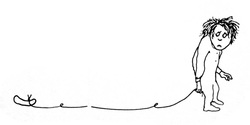

HOT DOG
I have a hot dog for a pet,
The only kind my folks would let
Me get.
He does smell sort of bad
And yet,
He absolutely never gets
The sofa wet.
We have a butcher for a vet,
The strangest vet you ever met.
Guess we're the weirdest family yet,
To have a hot dog for a pet.
热狗
我的宠物是热狗,
爸妈只准我养
这种狗。
闻起来确实有点臭,
但绝不会尿得沙发
湿透透。
我们的兽医是个屠夫,
没有比他便怪的人物。
说到怪还是我们家最奇怪,
竟然养热狗当宠物。
Poem by Shel Silverstein
Translation by 鄭小芸
Thoughts:
I have a hot dog for a pet,
The only kind my folks would let
Me get.
He does smell sort of bad
And yet,
He absolutely never gets
The sofa wet.
We have a butcher for a vet,
The strangest vet you ever met.
Guess we're the weirdest family yet,
To have a hot dog for a pet.
热狗
我的宠物是热狗,
爸妈只准我养
这种狗。
闻起来确实有点臭,
但绝不会尿得沙发
湿透透。
我们的兽医是个屠夫,
没有比他便怪的人物。
说到怪还是我们家最奇怪,
竟然养热狗当宠物。
Poem by Shel Silverstein
Translation by 鄭小芸
Thoughts:
- I like how the translator used the same line spacing as the original.
- 'He does' translated as 确实 is quite well done. Imagine the reader saying "He does smell sort of bad...", with the emphasis on 'does'. 确实brings this across well. Although . . . now I'm thinking that "He does. . . " feels like the boy is admitting something bad about his pet (kind of like it is hiding 'although' within it), while 确实 doesn't necessarily have this flavor to it...
- 'He never gets the sofa wet' as 绝不会尿得沙发湿透透 is interesting. In English we just say 'wet the bed', 'get the sofa wet' etc - it is not necessary to explicitly state that urination was involved. The Chinese version, on the other hand, states explicitly that "[he] definitely wouldn't/couldn't urinate [and] soak the sofa right through."
- In translating "The strangest vet you've ever met" I feel that in trying to get a rhyme with 'pet' (pet-person 宠物-人物) the translator lost some of the feeling of the original. Saying that "Nobody is stranger than this person" (没有比他更怪的人物) takes the emphasis off of him being the strangest veterinarian one could meet.
- "Guess we're the weirdest family yet" is very difficult to translate. First of all, how do you translate 'guess' (here it is 'I guess') into Chinese? And then you have 'yet' at the end of the sentence . . . what to do with this? So the translator chose to write "Speaking of strange, [I guess] our family is the strangest" (说道怪还是我们家最奇怪). To convey the meaning of 'I guess', as far as I can tell the translator used 还是, which literally means 'still' (or 'or'), but in this context does feel quite similar to 'I guess'. For translating 'yet' I think it is the 说到怪 ('speaking of strange') that conveys this word's effect upon the sentence.
- Although the original uses 'strange' and 'weird', the translation only uses one word (奇怪) for both of them. Perhaps it was a way of linking the two lines together (i.e. "Speaking of strange..." in the second of the two lines).